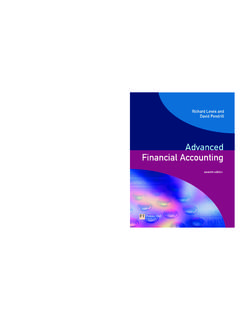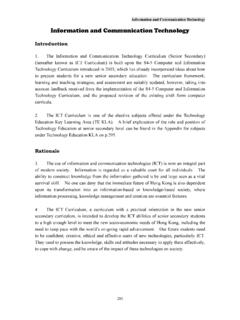Transcription of Education and Skills Funding Agency (ESFA)
1 Education and Skills Funding Agency (ESFA) framework document November 2017 2 Contents 1. Introduction 3 2. ESFA purpose 3 3. Governance and accountability 4 ESFA legal origins of powers and duties 4 Overall aims 5 Ministerial responsibility 6 Contact and engagement 7 Department for Education Accounting Officer s specific accountabilities and responsibilities as Principal Accounting Officer 8 Responsibilities of the ESFA Chief Executive as Accounting Officer 9 Responsibilities to the ESFA Management Board 10 ESFA Management Board 11 Annual report and accounts 13 Internal audit 14 External audit 15 Complaints and investigations 16 LocatED sponsorship 17 4. Management and financial responsibilities 17 Managing Public Money and other government-wide corporate guidance and instructions 17 Corporate governance 18 Information assurance and security 19 Risk management 19 Corporate and business plans 20 Budgeting procedures 20 Financing and cash management 21 Delegated authorities 22 Financial management and reporting 23 Reporting performance to the department 24 Shared services 25 Staff 27 Review of ESFA s status 29 5.
2 Arrangements in the event that the ESFA is wound up 29 Appendix 1: Government-wide corporate governance instructions 31 3 1. Introduction This framework Document has been drawn up to underpin and facilitate the relationship between the Education and Skills Funding Agency ( the ESFA ) and other parts of the Department for Education ( the department ). The document sets out the broad framework within which the ESFA will operate. It does not convey any legal powers or responsibilities but all parties will operate within its terms. It has been signed and dated by the Permanent Secretary of the department, the Parliamentary Under Secretary of State for the Schools System, the Minister of State for Apprenticeships and Skills and the Chief Executive of the ESFA. The ESFA or the department may propose amendments to this document at any time and it will be reviewed at least every 3 years thereafter under arrangements agreed by the Permanent Secretary, the Secretary of State and the Chief Executive.
3 The document may be reviewed at any time if they so wish. Significant variations to the document must be cleared with HM Treasury and the Cabinet Office, and the department, as appropriate. Any questions regarding the interpretation of the document will be resolved by the Permanent Secretary or their representative after consultation with the ESFA and, as necessary with the Cabinet Office and/or HM Treasury. The ESFA and the Permanent Secretary have made a commitment to keep the governance arrangements set out in this framework Document under review and will take stock of them in one year s time from the publication date. The ESFA will be subject to a tailored review at least once in the lifetime of a Parliament, in line with the Cabinet Office policy for the tailored reviews of public bodies. It is anticipated that the ESFA will be subject to a tailored review by no later than 1 April 2019.
4 Copies of the document have been placed in the Libraries of both Houses of Parliament and made available to members of the public on , as will any subsequent amendments. 2. ESFA purpose The ESFA is an executive Agency of the Department for Education , established on 1 April 2017 and replaces the Education Funding Agency and the Skills Funding Agency . 4 The ESFA has responsibility, on behalf of the Secretary of State for Education ( the Secretary of State ), to oversee and be accountable for the Funding of all 3 to 16 Education as well as post-16 Education and training for young people, apprenticeships and Funding for adult Education in England, excluding higher Education . It also manages and delivers school building and maintenance programmes. The ESFA s main strategic aims are to: be accountable for Funding for the Education and training sector, providing assurance that public funds are properly spent, achieves value for money for the tax payer and delivers the policies and priorities set by the Secretary of State regulate academies, further Education and sixth-form colleges, and independent training providers, intervening where there is risk of failure or where there is evidence of mismanagement of public funds deliver major projects and operates key services in the Education and Skills sector, such as school capital programmes, the National Careers Service, the National Apprenticeship Service the Learning Records Service and oversees the operation of LocatED, the department s arm s length body which procures sites for free schools The ESFA s vision, mission statement.
5 Objectives and deliverables will be set out in the Agency s business plan at the beginning of each financial year and published on More information about the business plan is available in the Finance, Performance and Reporting section of this framework Document. 3. Governance and accountability ESFA legal origins of powers and duties As an executive Agency of the department, the ESFA acts on behalf of the Secretary of State in delivering its core functions. Under section 10 of the Education Act 1996, the Secretary of State has a general duty to promote the Education of the people of England. The ESFA enables the Secretary of State to comply with this duty by delivering the revenue and capital Funding for Education and training for 3- to 19-year-olds (and higher needs students of 19 to 25), further Education for those aged 19 plus, and apprenticeship training.
6 5 This Funding is provided by way of grant Funding under section 14 of the Education Act 2002 or section 100 of the Apprenticeships, Skills , Children and Learning Act 2009, or under contract (for academies this is an academy agreement under section 1 of the Academies Act 2010). Overall aims The Secretary of State has agreed that, subject to the Agency s main duties set out in the section above, the aims of the ESFA should be as follows: make accurate and timely revenue and capital Funding allocations to schools and Education and training providers each year put in place Funding agreements with ESFA-funded providers, and provide accurate and timely Funding data and information to enable the department to make payments of revenue and capital Funding to ESFA-funded providers each year ensure that capital programmes in schools and colleges are delivered efficiently and effectively, including the delivery of the Priority School Building Programme; school condition Funding ; school condition data collection.
7 And working with LocatED and the department to secure and develop sites to enable new free schools to open support the government s reform of apprenticeships and ambition of 3 million high quality apprenticeships to start in England between May 2015 and the end of 2020, including by: ensuring that increasing numbers of employers benefit from the reforms to apprenticeships; maintaining the apprenticeship Funding system; and enhancing the apprenticeship service, providing seamless, easy-to-use services for employers, apprentices and citizens, providers and other users champion the opportunities for learners and employers to engage in high-quality Education and training opportunities, including by: maintaining the high-quality digital offer of the National Careers Service; and supporting the development and delivery of high-quality traineeships ensure the proper use of public funds through financial assurance, acting on behalf of the Secretary of State to ensure that ESFA-funded providers are complying with their Funding agreements and relevant statutory legislation, and intervening swiftly and 6 proportionately where necessary contribute to the financial health of the Education and training sector, supporting ESFA-funded providers to maintain financial health including by: assessing the financial health of all providers; supporting the effective evaluation of contracting decisions; ensuring that the provider base is sustainable and best equipped to provide high quality Education and training.
8 And promoting good financial management and financially resilient institutions monitor and support the implementation of the recommendations from post-16 area reviews including providing financial support for restructuring of post-16 institutions where other Funding sources are not available Ministerial responsibility The ESFA will be overseen by 2 responsible ministers, who will account for business in Parliament as needed: the Minister of State for Apprenticeships and Skills ; and the Parliamentary under Secretary of State for the School System. Ministers will be responsible for signing off the strategic aims of the ESFA, and ensuring that they are being delivered, as well as its business and corporate plans. The Minister of State for Apprenticeships and Skills is responsible for the following areas of the ESFA s work: apprenticeships and traineeships technical Education and Skills careers Education , information and guidance post-16 Funding (including support for young people and adult learners) further Education colleges, sixth-form colleges and local patterns of provision adult Education The Parliamentary Under Secretary of State for the School System is responsible for the following areas of the ESFA s work.
9 A strong school system (including free schools, academies, multi- academy trusts, university technical colleges and studio schools) school governance and underperformance 7 admissions school capital investment (including new school places, school maintenance, land, and playing fields) The Secretary of State will ultimately account for business in Parliament. Contact and engagement The Department for Education is the responsible department for the ESFA and the ESFA has no separate legal basis other than that which comes from the department. The core department and the ESFA will have an open and honest, trust-based partnership supported by the principles set out in Partnerships between Departments and Arms Length Bodies (ALBs): Code of Good Practice . As such, both parties will ensure that they clearly understand each other s strategic aims and objectives.
10 They will also commit to keeping each other informed of any significant issues and concerns. The Delivery Unit in the department is the primary contact for the ESFA. They are the main source of advice to the responsible ministers on the discharge of their responsibilities in respect of the ESFA they also will also support and brief the Principle Accounting Officer (PAO) on his or her responsibilities toward the ESFA as its senior sponsor. In addition to routine and policy lead contact between the department and the ESFA, meetings will take place at the following frequency, or when needed between: the Secretary of State, the ESFA Chief Executive Officer (CEO) and ESFA Management Board Chair (at least twice yearly) the CEO and other responsible ministers on a bi-monthly basis The ESFA CEO as a member of the department s Board and Management Committee will submit for discussion, an Efficiency and Effectiveness Statement once a year to the Board, and every 6 months to Management Committee the Permanent Secretary and the ESFA CEO, Chair of the ESFA Management Board and any relevant ESFA directors for a formal performance review (quarterly) - other directors from the core department may attend when necessary Any disputes between the core department and the ESFA will be resolved by an internal process overseen by the Permanent Secretary of the 8 Department for Education , in consultation with the Secretary of State.














